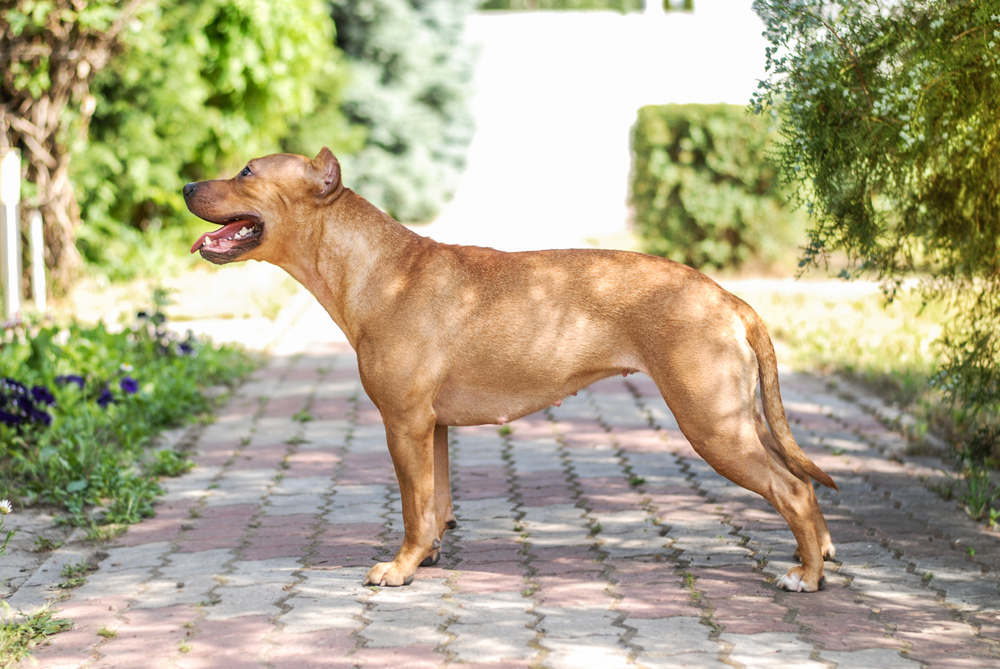Strong, compact, and ready to play, Pitbulls are a friendly breed that doesn’t mind a smaller home as long as there’s plenty of affection to go around. These dogs are very adaptable and almost always interested in socializing with humans. While highly intelligent and trainable, a Pitbull dog requires a strong hand in guiding them toward good manners and healthy behavior. Perhaps most notably, they remain eager, excitable, and puppy-like throughout their lives, making them enthusiastic companions for anyone looking to live an active lifestyle.
Pitbull Average Size and Life Expectancy
- Height: 18-21 inches
- Weight: 30-60 pounds
- Life Span: 12-14 years
Pitbull Characteristics and Traits
Friendliness
Affectionate with family 5/5
Typically, Pitbulls can’t wait to shower you and your family with affection. While they may form significant bonds with the family member who spends the most time with them, Pitbulls are widely known to be great dogs for the entire family. Plus, breed disposition doesn’t always define how your dog will react with your family, and more often than not, the bonds you build are all about personal experience.
Good with other dogs 1/5
Dogs don’t always play nicely with their own kind, and Pitbulls are guilty of sometimes being aggressive with other dogs. They may be inclined to dominate or fear their fellow canines, but this behavior is often linked to how your dog was socialized as a puppy and whether they spent significant time with their litter or among other dogs.
Good with children 5/5
The nurturing nature of Pitbulls can make them perfect companions or guardians for young children. Where other dogs may be more sensitive or nervous with small humans, the Pitbull temperament is typically eager to entertain, show affection, and protect children. However, young children should be taught proper pet etiquette for their own safety, as well as for the overall health of the animal.
Good with strangers 5/5
Pitbulls are known to become fast friends with humans. Just be sure to keep your Pitbull leashed during the initial introductions for everyone’s comfort.
Adaptability
Adapts well to apartment living 3/5
Small spaces may be overwhelming for some pups, while others won’t feel the least bit bothered. Pitbulls are typically comfortable in apartments as long as they receive the proper amount of play and exercise to keep them healthy and happy.
Good for novice owners 4/5
Pitbulls’ low-maintenance, high-energy demeanor can make them an obvious choice for first-time dog owners. While they may be a bit needy when it comes to attention, Pitbulls don’t require specialized knowledge or unique treatment. Good training, a good home, and plenty of love are all these dogs require.
Sensitivity level 4/5
Fireworks, traffic, and even large parties can be enough to set off a highly sensitive Pitbull. No one wants to watch their pooch cower in the corner, so be certain your environment isn’t too stimulating for your new pet.
Tolerates being alone 1/5
Though many of us would prefer to spend all day with our dogs, that isn’t always an option. While some breeds may be comfortable with alone time, Pitbulls can become anxious or destructive when left alone for long periods. For dogs with separation anxiety or general troubles being left alone, a dog watcher or at-home family member may be a necessity for their happiness and well-being.
Tolerates cold weather 2/5
Winter weather and snow can pose a serious problem for Pitbulls with short coats and low body fat. Fortunately, there are always doggy sweaters, coats, and vests for walks during the winter months.
Tolerates hot weather 3/5
The Pitbull’s short nose can make the warmer months a little more difficult for them compared to other dogs. All owners should be vigilant for heatstroke during the hotter months, but those with extra sensitive dogs like Pitbulls may have to keep their pups inside during summer scorchers.
Health and Grooming Needs
Shedding level 4/5
For the allergy-prone owner, shedding can present an obstacle for enjoying time with Pitbulls—some may shed more seasonally, while others are known to shed all year.
Coat grooming frequency 1/5
When it comes to brushing, washing, or trimming, keeping your Pitbull’s coat healthy is essential to their overall happiness. That said, they require so little maintenance that it’s easy to go the extra mile to help them feel their best.
Drooling level 1/5
All dogs are known to give out some wet kisses, but Pitbulls aren’t particularly slobbery. While you can still expect to see some drool around dinner time, you shouldn’t have to wipe up a lot of saliva anytime soon.
Coat type/length 1/5
Pitbulls sport a short, no-nonsense coat that makes bathtime quick and easy. Owners won’t have to worry about matted hair or dirt getting stuck in their coat. Your Pitbull may never even need to see a groomer unless you’re looking to give them an extra special experience.
General health 4/5
Some breeds are prone to genetic illnesses and disorders due to their heritage. Luckily, Pitbulls are not particularly susceptible to most illnesses, and with proper preventative care, they can easily live a full and healthy life.
Potential for weight gain 3/5
From eager exercisers to total couch potatoes, Pitbulls vary in their desired activity level. However, this breed is susceptible to thyroid problems, which can lead to weight gain among other symptoms. It’s important to help your dog maintain a healthy weight for their general wellness.
Size 3/5
Neither pocket-sized nor massive, Pitbulls are in the goldilocks zone when it comes to dog size. The average Pitbull size ranges from 18 to 21 inches, but Pitbulls are often crossed with other breeds, making their size slightly unpredictable.
Trainability
Easy to train 4/5
Pitbulls are quick to associate commands and behavior. That said, it will still take patience, consistency, and plenty of treats to train your pup. Even the most stubborn Pitbull will eventually start learning when given a tasty snack and plenty of encouragement.
Intelligence 4/5
High-intelligence dogs are happiest when putting their brains to work, so try to keep your Pitbull’s mind engaged with frequent interaction and stimulation. This can mean teaching them new commands, refining old ones, or playing games that put your Pitbull’s mind to the test.
Prey drive 3/5
Some breeds are natural hunters. Whether chasing game or chasing cars, Pitbulls can be easily excited. Keep a close eye out for any small animals that might cause your Pitbull to take off running and be sure to keep them safely fenced in when unsupervised.
Tendency to Bark/Howl 3/5
Pitbulls are quick to let out a bark once in a while but not typically so loud that they’ll disturb your neighbors. It’s just one reason why Pitbulls are popular in both urban and rural areas.
Wanderlust potential 4/5
Many Pitbulls jump at the chance to explore on their own—and this can mean running at the first opportunity. While we might like to imagine our dogs on an exciting adventure, it’s certainly no fun searching the neighborhood for your lost pup, so keep them on a leash or fenced in unless you’re confident that they’ll remain by your side.
Physical Needs
Energy level 4/5
Puppies are often hyperactive, but most Pitbulls keep their youthful vigor well into adulthood. If you’re looking for a dog to keep you active, a Pitbull may be a source of endless excitement. On the other hand, if you’re looking to kick back and relax with a pooch, you might find a low-energy dog to be a better match for your lifestyle.
Intensity 5/5
Closely related to a breed’s energy level is its intensity. If you’re interested in a pup that runs with all their might, gives 200 percent at playtime, and eats every meal as though it’s their last, you’re ready for a Pitbull.
Exercise needs 4/5
While most Pitbulls love a good walk, many will need frequent and intense play to feel fulfilled and engaged. Some may even be happiest when performing in dog sports or pushed to the limit alongside an active owner.
Playfulness 5/5
Where some breeds may become a little less playful as they age, Pitbulls act like perpetual puppies. If you’re looking forward to the next walk, run, or fetch with a dog, then a playful Pitbull may be exactly what you need.
Mental stimulation 4/5
Dogs aren’t just physical creatures—many require a significant mental challenge to stay content. Pitbulls crave complex toys and food puzzles to keep them actively thinking on a daily basis.
More About Pitbulls
These beloved social butterflies are perhaps best known for greeting their owners with puppy-like enthusiasm well into their golden years. Pitbulls are high-energy matched with serious intensity, so be sure you have the stamina to keep up with these majestic dogs. That said, don’t mistake your Pitbull’s enthusiasm for foolishness. This breed is known for an intellect that matches their cheerful demeanor.
For decades, the Pitbull’s place in popular culture was contentious at best. Bred for the now-outlawed sport of dogfighting, the information surrounding these pooches is often skewed or misleading. It’s essential to remember that Pitbulls are kind, caring, and friendly dogs that enjoy meeting new people. Today, many people have moved past the initial stigma associated with Pitbulls, exhibited by a renewed interest in adopting and caring for these dogs. They are, after all, amazingly loyal companions for anyone willing to put in the time.
Despite their interest in all things human, these dogs can be a bit willful without proper training. They’re known to wander when left to their own devices, and should always be kept on a leash for everyone’s safety. The breed is also known to have a more difficult time interacting with other dogs, so it’s best to begin socializing your Pitbull as early as possible. They can easily become accustomed to their fellow canine, given the right circumstances.
From early puppyhood, it’s necessary to spend adequate time with your Pitbull to ensure they have the proper manners and social skills that will provide them with the best possible life. Pitbulls love to be out in the world, so make that they can be around dogs, cats, and people without lapsing into anger or agitation. With a plan in place for early training, you’ll likely find yourself smiling alongside your dog every single day.
Pitbull History
Descended from the bull and terrier breeds, Pitbull history stretches back nearly 200 years in the British isles, though the dogs first started making waves in America during the late 19th century. Following the Civil War, Pitbulls were used on farms for various tasks, including cattle and sheep herding. Additionally, Pitbulls were even used as guard dogs, protecting homesteads from wild animals.
Following their heyday as working dogs, they quickly ascended to the forefront of American culture and were prominently featured in advertisements throughout the first half of the 20th century. Because of their fearless and hardworking demeanors, the image of the Pitbull became closely associated with the military during WWI and WWII, while gaining popularity as the companion to famed figures like Helen Keller and Mark Twain.
While the Pitbull image was partially sullied during the second half of the 20th century, due to the rise of illegal and cruel dog-fighting activities, Pitbulls continue to be beloved pets for families across the county. Advocates have worked to dispel the misinformation about Pitbulls and bring these beautiful creatures to the forefront of culture once again. Today, you can see Pitbulls engaged in national competitions, acting as service dogs, or simply walking down the street with their loving owners.
Pitbull Facts
- Pitbulls have lived in the White House—with President Woodrow Wilson and President Teddy Roosevelt.
- Baby Pitbulls can be identified by a wrinkly forehead that they eventually grow out of.
- Pitbulls rank 4th out of 122, according to the American Temperament Test Society, in terms of most affectionate and least aggressive dog breeds.
- The United States Army welcomed a Pitbull into its ranks during World War I. Sargent Stubby was a world-famous dog who fought in 17 battles and received a hero’s welcome when returning home from the war.
- Pitbulls were once called “nanny dogs” because of their calm temperament with children.
- While Pitbulls may look intimidating due to their muscular bodies, they aren’t particularly good guard dogs, due to their friendliness with strangers.
What You Need to Know as a Pitbull Owner
As a dog owner, your pup depends on you for everything—from affection to nutrition. Additionally, there are some specific Pitbull characteristics to keep in mind when identifying the best ways to take care of your pooch. To fully understand what your Pitbull needs to have an amazing life, read on.
Pitbull Health & Preventative Care
Despite their robust health, Pitbulls are prone to a few common health issues. Be sure to keep a close eye on your pup’s teeth, as Pitbulls frequently suffer from periodontal disease that can lead to serious dental problems. With regular brushing and the occasional professional cleaning, you can fight back against plaque and tartar. Additionally, Pitbulls are genetically predisposed to developing hip dysplasia and knee problems as they age, so watch out for abnormal behavior or signs of pain like excessive scratching, vomiting, or exhaustion—these can be signs of a medical problem that requires veterinary treatment.
Recommended Health Tests From the National Breed Club:
- Hip Evaluation
- Elbow Evaluation
- Ophthalmologist Evaluation
Pitbull Temperament & Emotional Wellness
Despite looking tough, the average Pitbull is a bit of a baby. That means they don’t appreciate being left alone for significant periods of time and may become distraught or destructive without frequent attention. In addition, it may be best to socialize them early with other dogs to make walks around the block a little easier. An untrained Pitbull may be more likely to act out and misbehave around other canines.
Pitbull Environmental
Pitbulls aren’t naturally bred for hot or cold weather, so keep an eye on their comfort level when walking during more extreme temperatures. Fortunately, these highly adaptable dogs can live happily almost anywhere. Whether you’re living on a few acres in the country or confined to a one-bedroom in the city, you can always make the best of it by providing plenty of attention and affection to your Pitbull—at the end of the day, that’s what they want the most.
Pitbull Exercise & Play
Always puppies at heart, Pitbulls love a game of fetch or a round of tug of war at any time of day. When it comes to Pitbull breed info, play and exercise are frequently at the top of the list. High-intensity play is a key component of the Pitbull profile, so look forward to going all out when you initiate your regular playtime. You shouldn’t have to worry about over exhausting your Pitbull—you’re more likely to get tired first—but make sure your frequent playtime is balanced with plenty of snuggles.
Pitbull Behavior & Training
Of all the Pitbull facts, their overall behavior as a breed is the most frequently misinterpreted. These dogs are sensitive and smart, meaning they can easily pick up complex commands through positive reinforcement and frequent training sessions. Pitbulls deeply desire to please their owners but can be easily distracted by outside stimuli—like a squirrel in a tree or a dog across the street. That’s why diligence and firmness are required during early Pitbull training.
Pitbull Nutrition
Typically, as your Pitbull reaches adulthood and old age, you can lower their overall calorie intake while continuing to keep nutrient levels high. Protein should make up about 18-22% of their total calorie intake. In addition to standard dog food, feel free to include raw meat, treats, and dog-approved vegetables in your Pitbull’s diet. However, avoid overfeeding your Pitbull by keeping a close eye on supplementary foods. Check with your vet if you have any questions about food safety or ingredients.
Learn How to Properly Care for Your Pitbull & Get Nutrition Information from AskVet’s Professional Veterinarians






